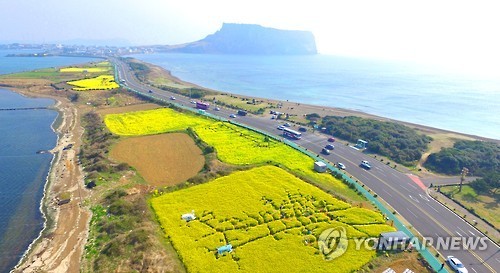The southern resort island of Jeju witnessed a sharp rise in the number of domestic tourists recently, industry sources said Friday, amid a drop in Chinese tourists triggered by a row between Seoul and Beijing over the deployment of an advanced US missile defense system.
The Chinese government has banned imports of Korean pop culture content and the sale of tour packages to South Korea as part of retaliations against the installation of the Terminal High Altitude Area Defense system on South Korean soil.
 |
Tourism in Korea (Yonhap) |
Beijing insists THAAD will undermine China's security interests, although Seoul says it is to defend against North Korean provocations, not against China.
The number of South Korean tourists who flew into Jeju for the first eight days this month rose 13.5 percent to 218,709, compared with 192,725 during the same period last year, the sources said.
The number of Chinese tourists who transferred at other South Korean cities to get on flights to Jeju was 9,000 during the period, down 88.9 percent from 17,000 a year earlier.
More than 40 percent of rental cars have been reserved in Jeju Island in recent weeks as the number of domestic tourists continued to grow, a source said.
The local tourism industry is taking advantage of the decrease in Chinese nationals to invite more tourists from Japan and Southeast Asian nations, as well as domestic tourists.
"It is true we were unable to fly additional flights for domestic tourists and those from other countries because the Jeju
International Airport had been packed with airplanes carrying Chinese tourists," said Ko Seung-ik, an official of the tourism association in Jeju Island.
He said his association is currently marketing airfare to students for school excursions.
In the past large numbers of South Korean tourists went to China, but many of them are now turning to Jeju or Southeast Asian countries due to the diplomatic row over the missile deployment, industry sources said.
South Korean airliners are also flying charter flights to Japan and Southeast Asian countries, which had been reduced to accommodate burgeoning Chinese demand, they said.
The head of a tour agency, who identified himself as his family name Chung, said sales of his agency grew more than 30 percent last month from a year earlier as more domestic tourists are flocking to Jeju to fill up the vacuum made by Chinese tourists.
An employee of another tour agency said a growing number of local tourists have come to Jeju in recent weeks to enjoy the scenic beauty of Jeju island.
"I don't think the value of Jeju tourism will change because of the declining number of Chinese tourists," he said. (Yonhap)






![[Herald Interview] 'Trump will use tariffs as first line of defense for American manufacturing'](http://res.heraldm.com/phpwas/restmb_idxmake.php?idx=644&simg=/content/image/2024/11/26/20241126050017_0.jpg)
![[Exclusive] Hyundai Mobis eyes closer ties with BYD](http://res.heraldm.com/phpwas/restmb_idxmake.php?idx=644&simg=/content/image/2024/11/25/20241125050044_0.jpg)
